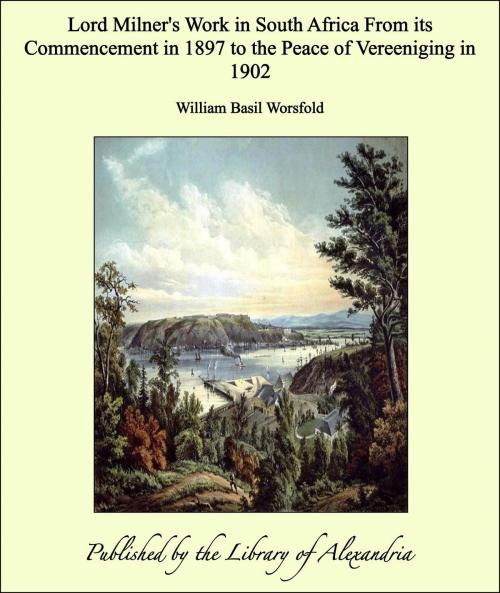Lord Milner's Work in South Africa From its Commencement in 1897 to the Peace of Vereeniging in 1902
Nonfiction, Religion & Spirituality, New Age, History, Fiction & Literature| Author: | William Basil Worsfold | ISBN: | 9781465557728 |
| Publisher: | Library of Alexandria | Publication: | July 29, 2009 |
| Imprint: | Library of Alexandria | Language: | English |
| Author: | William Basil Worsfold |
| ISBN: | 9781465557728 |
| Publisher: | Library of Alexandria |
| Publication: | July 29, 2009 |
| Imprint: | Library of Alexandria |
| Language: | English |
In sending this book to press I have only two remarks to make by way of preface. The first is wholly personal. It has been my good fortune to reside twice for a considerable period in South Africa—first in the neighbourhood of Capetown (1883-5), and afterwards in Johannesburg (1904-5). During these periods of residence, and also during the long interval between them, I have been brought into personal contact with many of the principal actors in the events which are related in this book. While, therefore, no pains have been spared to secure accuracy by a careful study of official papers and other reliable publications, my information is not derived by any means exclusively from these sources. My second remark is the expression of a hope that the contents of this book may be regarded not merely as a chapter of history, but also as a body of facts essential to the full understanding of the circumstances and conditions of South Africa, as it is to-day. Since the restoration of peace—an event not yet five years old—a great change has been wrought in the political and economic framework of this province of the empire. None the less, with a few conspicuous exceptions, almost all of the principal actors in these pages are still there; and, presumably, they are very much the same men now as they were before, and during, the war. And in this connection it remains to notice an aspect of the South African struggle which transcends all others in fruitfulness and importance. It was a struggle to keep South Africa not a dependency of Great Britain, but a part of the empire. The over-sea Britains, understanding it in this sense, took their share in it. They made their voices heard in the settlement. The service which they thus collectively performed was great. It would have been infinitely greater if they had been directly represented in an administration nominally common to them and the mother country. No political system can be endowed with effective unity—with that organic unity which is the only effective unity—unless it is possessed of a single vehicle of thought and action. To create this vehicle—an administrative body in which all parts of the empire would be duly represented—is difficult to-day. The forces of disunion, which are at work both at home and beyond the seas, may make it impossible to-morrow. W. B. W
In sending this book to press I have only two remarks to make by way of preface. The first is wholly personal. It has been my good fortune to reside twice for a considerable period in South Africa—first in the neighbourhood of Capetown (1883-5), and afterwards in Johannesburg (1904-5). During these periods of residence, and also during the long interval between them, I have been brought into personal contact with many of the principal actors in the events which are related in this book. While, therefore, no pains have been spared to secure accuracy by a careful study of official papers and other reliable publications, my information is not derived by any means exclusively from these sources. My second remark is the expression of a hope that the contents of this book may be regarded not merely as a chapter of history, but also as a body of facts essential to the full understanding of the circumstances and conditions of South Africa, as it is to-day. Since the restoration of peace—an event not yet five years old—a great change has been wrought in the political and economic framework of this province of the empire. None the less, with a few conspicuous exceptions, almost all of the principal actors in these pages are still there; and, presumably, they are very much the same men now as they were before, and during, the war. And in this connection it remains to notice an aspect of the South African struggle which transcends all others in fruitfulness and importance. It was a struggle to keep South Africa not a dependency of Great Britain, but a part of the empire. The over-sea Britains, understanding it in this sense, took their share in it. They made their voices heard in the settlement. The service which they thus collectively performed was great. It would have been infinitely greater if they had been directly represented in an administration nominally common to them and the mother country. No political system can be endowed with effective unity—with that organic unity which is the only effective unity—unless it is possessed of a single vehicle of thought and action. To create this vehicle—an administrative body in which all parts of the empire would be duly represented—is difficult to-day. The forces of disunion, which are at work both at home and beyond the seas, may make it impossible to-morrow. W. B. W















